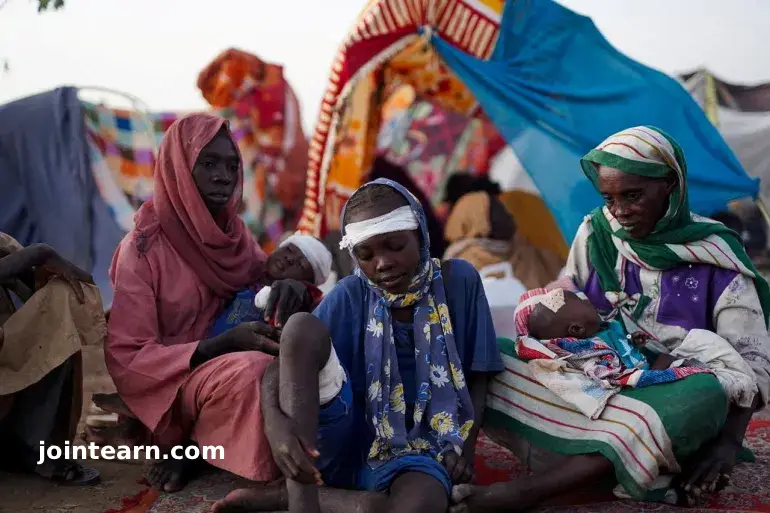
The United Nations has issued a sharp condemnation of what officials described as “horrifying” mass killings and atrocities committed by the Rapid Support Forces (RSF) in el-Fasher, the capital of North Darfur, Sudan.
UN leaders warned that the once-vibrant city has now “descended into an even darker hell” following the RSF’s full takeover and the Sudanese army’s withdrawal from its last major stronghold in the western Darfur region.
UN Warns of Worsening Atrocities in El-Fasher
Speaking at an emergency UN Security Council session on Thursday, Martha Ama Akyaa Pobee, the UN Assistant Secretary-General for Africa, said the organization has received credible reports of mass killings, executions, and house-to-house searches targeting civilians attempting to flee.
“The situation is simply horrifying,” Pobee said. “Despite commitments to protect civilians, the reality is that no one is safe in el-Fasher. There is no safe passage for people to leave.”
The UN Human Rights Office confirmed that its monitors have gathered multiple testimonies describing summary executions, sexual violence, and indiscriminate attacks against displaced civilians.
UN Humanitarian Chief: “We Cannot Hear the Screams”
UN Humanitarian Coordinator Tom Fletcher delivered a harrowing statement to the Council, saying that the RSF’s capture of el-Fasher has plunged an already devastated region into chaos.
“We cannot hear the screams, but as we sit here today, the horror is continuing,” Fletcher said. “Women and girls are being raped, people are being mutilated and killed with utter impunity.”
Fletcher described the situation as a catastrophic humanitarian collapse, with tens of thousands of residents trapped without food, medicine, or access to aid agencies.
Civilians Trapped Under Siege, Thousands Flee on Foot
Before the city’s fall, the RSF had maintained an 18-month siege that left hundreds of thousands trapped without essential supplies. According to UN estimates, more than 36,000 civilians have fled since Saturday — most of them on foot — to Tawila, a town about 70 kilometers (43 miles) west of el-Fasher.
“There was a lot of shelling,” said Fatima Abdulrahman, one of the displaced survivors now in Tawila. “Shelling killed my daughter, injured my other daughter’s eye, and paralyzed my son. My body is full of wounds and swollen.”
Tawila, already sheltering over 650,000 displaced people, is struggling to cope with the sudden influx of new arrivals. Aid workers warn that the situation could deteriorate rapidly as food and medical supplies run out.
The RSF’s Capture of El-Fasher and Risk of Sudan’s Further Fragmentation
The RSF’s capture of el-Fasher marks a significant military and symbolic victory in Sudan’s ongoing civil war. The conflict began in April 2023, when tensions between the Sudanese Armed Forces (SAF) and the RSF exploded into all-out fighting in Khartoum.
Since then, the war has killed tens of thousands and displaced more than 12 million people, making it one of the world’s worst humanitarian crises.
Analysts warn that the fall of el-Fasher could further divide Sudan, potentially paving the way for another national split, reminiscent of South Sudan’s secession in 2011.
Sudan’s UN Ambassador Accuses RSF of ‘Genocide’
At the UN session, Al-Harith Idriss Al-Harith Mohamed, Sudan’s ambassador to the UN, described the events unfolding in el-Fasher as “genocide by all legal standards and definitions.”
“Women and girls are attacked in broad daylight,” he said. “This is not an isolated incident — it is a continuation of systematic ethnic cleansing carried out by this militia since April 2023.”
The ambassador demanded that the UN Security Council classify the RSF as a terrorist organization, enforce the arms embargo already in place, and sanction foreign states providing military or logistical support to the paramilitary group.
Humanitarian Agencies Warn of Catastrophic Collapse
Aid organizations working in Tawila and surrounding regions say that the humanitarian situation is reaching breaking point.
Mary Brace, technical protection advisor for Nonviolent Peaceforce, said civilians arriving from el-Fasher are “exhausted, traumatized, and desperate.”
“The conditions are catastrophic,” Brace told Al Jazeera. “There’s no guarantee of safe passage for civilians, and people are living in extreme fear and trauma.”
With supply chains disrupted and infrastructure destroyed, aid workers fear the spread of disease, malnutrition, and large-scale famine across North Darfur.
International Pressure Mounts
The United Nations, African Union, and regional governments have all condemned the escalating violence, but efforts to broker a ceasefire have repeatedly failed.
Last year, the UN called on member states to halt all arms shipments to the warring parties, while the Security Council sanctioned two RSF generals for orchestrating violence and human rights abuses.
However, with the RSF now controlling most of Darfur, diplomats warn that the international community’s failure to intervene decisively could result in another ethnic cleansing campaign similar to the atrocities of the early 2000s.
What Comes Next for Sudan
As the RSF consolidates control in western Sudan, aid agencies warn that the country’s humanitarian map is collapsing, with millions on the brink of famine.
The United Nations continues to appeal for safe corridors for civilians, unrestricted humanitarian access, and an immediate cessation of hostilities.
Without urgent global action, experts fear that Sudan’s war could become the next long-term regional catastrophe, destabilizing neighboring countries including Chad, South Sudan, and the Central African Republic.


Leave a Reply